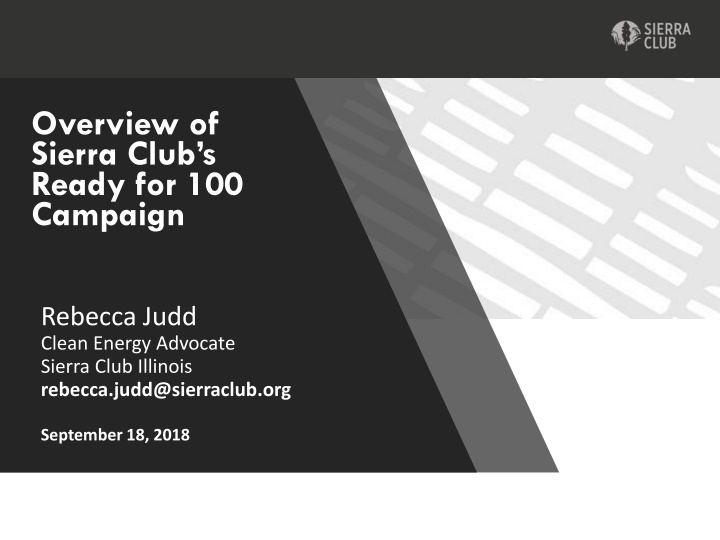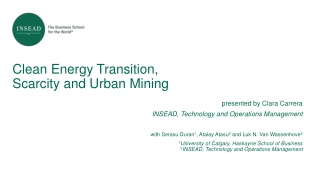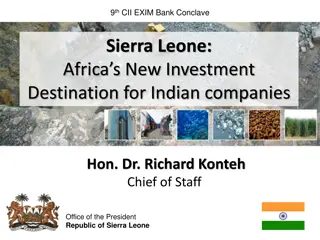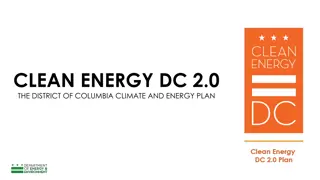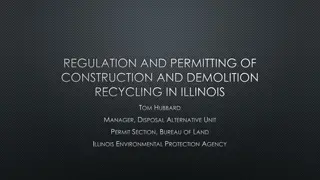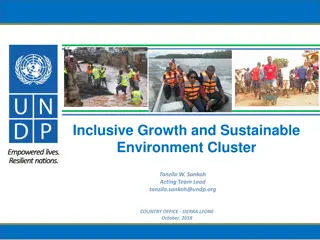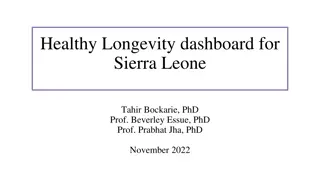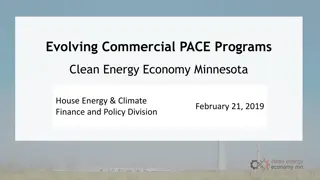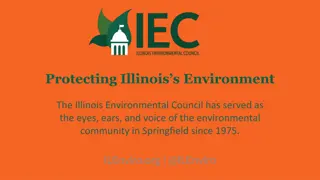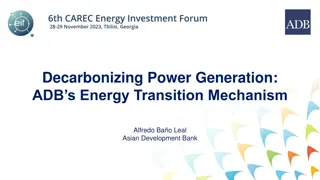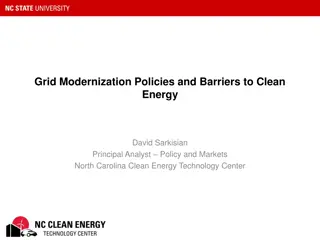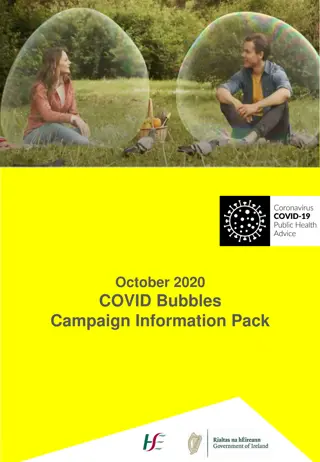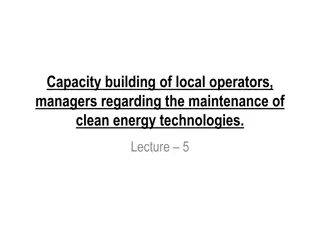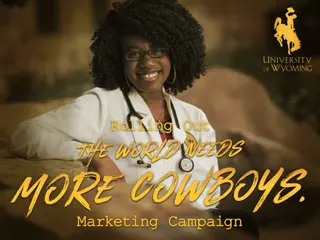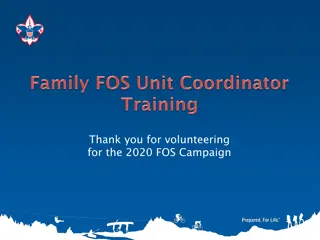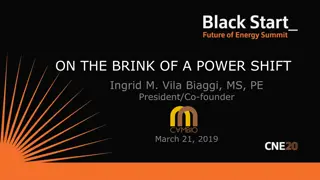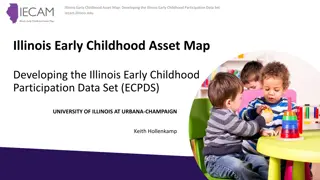Advancing Clean Energy Transition in Illinois: Sierra Club's Ready for 100 Campaign Update
Sierra Club's Ready for 100 campaign in Illinois highlights the progress in clean energy initiatives, such as utility-scale wind and solar projects, job creation, and the Future Energy Jobs Act. The focus now shifts to empowering local communities to lead the way towards achieving 100% clean, equitable energy, with over 200 mayors already pledging their support for the transition. By inspiring cities, businesses, and institutions to commit to clean energy, the campaign aims to elevate policymaker ambition at the state level for increased renewable energy goals.
Download Presentation

Please find below an Image/Link to download the presentation.
The content on the website is provided AS IS for your information and personal use only. It may not be sold, licensed, or shared on other websites without obtaining consent from the author.If you encounter any issues during the download, it is possible that the publisher has removed the file from their server.
You are allowed to download the files provided on this website for personal or commercial use, subject to the condition that they are used lawfully. All files are the property of their respective owners.
The content on the website is provided AS IS for your information and personal use only. It may not be sold, licensed, or shared on other websites without obtaining consent from the author.
E N D
Presentation Transcript
Overview of Sierra Club s Ready for 100 Campaign Rebecca Judd Clean Energy Advocate Sierra Club Illinois rebecca.judd@sierraclub.org September 18, 2018
Clean Energy is Already Here and Happening in Illinois According to the American Wind Energy Association, as of the end of 2016, Illinois had 48 utility-scale wind projects operating, producing over 4300 MW annually (ranking 6th nationally) According to a September 2017 report, 120,000 Illinoisans working in clean energy as of 2016 Historic clean energy law, the Future Energy Jobs Act (FEJA), passed in Illinois in 2016 More utility-scale wind and solar projects already in the queue to be developed and more on the way Significant on-site (rooftop) and community solar projects will be developed as these incentive programs open up early in 2019 and beyond! Even more jobs and projects are coming!
FEJA and its 25% statewide clean energy goal by 2025 is only the FIRST STEP
So how do we go even further? Let Local So how do we go even further? Let Local Communities Take the Lead! Communities Take the Lead! Communities can organize at the local level to get their own cities to commit to 100% clean, equitable energy We can then amplify these successes across the state to demonstrate 100% is not only possible but it s happening now We hope that cities moving to 100% will also inspire businesses, universities, places of business, and other institutions to go 100% As more cities and institutions declare 100% clean energy, and more people take action to demand it, it will raise policymaker ambition at the state level to increase the statewide goals
Sierra Club RF100 Campaign - Mayoral Pledges Mayors For 100% Clean Energy: Mayors from communities who have pledged their support for a vision toward a community-wide transition to 100% clean, renewable energy Over 200 mayors have made this pledge, including several from IL: Evanston, Village of Montgomery, Village of Chicago Ridge, Park Forest, Urbana, Granite City, Alton, Edwardsville Not an actionable goal or commitment with near-term steps to implement 5
vs. Actionable Commitments to 100% Renewable Energy The Ready for 100 Campaign recognizes community commitments as places where a city s leadership has established an actionable goal to transition the entire community to 100% clean, renewable energy Commitment can be announced through a stand-alone Resolution or Proclamation, city ordinance, or integrated into a community's Climate Action Plan or Energy Action Plan Community is committed to pursuing near-term steps to implement this goal 6
Core Elements of Commitment When crafting a commitment to 100% renewable energy, the adopted goal should include the following core elements: Community-wide Electricity Use: A full transition of the electricity sector to clean, renewable energy; By 2035: A target year for when this commitment will be achieved no later than 2035 for electricity and 2050 for all energy sectors; Ensure Justice, Equity, Affordability, and Access: Include measures that prioritize equity, affordability, and access for all members of the community, prioritizing low income communities, environmental justice communities and communities burdened by the fossil fuel industry; Clean and Renewable Resources Only: Clear definition of clean and renewable resources that includes carbon- and pollution-free energy that is sustainably collected from renewable sources such as wind, solar, and geothermal; and Transparent and Inclusive Planning and Implementation Process: A commitment to a transparent and inclusive process for planning and implementation, ensuring that all members of the community and local businesses have an opportunity to participate.
Number of Commitments To Date, 82 cities have made the commitment 6 of those cities have already hit their targets Aspen, CO; Burlington, VT; Georgetown, TX; Greensburg, KS; Rockport, MO; and Kodiak Island, AK 9 counties in the U.S. have also committed to 100% renewable energy: Buncombe County, NC; Floyd County, VA; Multnomah County, OR; Orange County, NC; Pueblo County, CO; Summit County, UT; Summit County, CO; Taos County, NM; Whatcom County, WA 2 states have made the commitment both Hawaii and California have committed to 100% renewable electricity by 2045 8
Examples Denver, CO: Good example of commitment in climate action plan In July 2018, Denver released its new Climate Action Plan that commits to transitioning the city to 100% clean, renewable electricity by 2030. The Plan also incorporates strategies for land use and development, home and business efficiency upgrades, and mass transit planning to meet an additional 80% carbon reduction goal by 2050. Minneapolis, MN: Good example of use of ordinance with an equity lens In April 2018, Minneapolis became the largest city in the Midwest to date to commit to 100% clean and renewable electricity by 2030. The resolution also calls for a blueprint for how to reach this goal, including the public engagement that is necessary, updates to the city s existing Climate Action Plan, and strategies for facilitating training and hiring from within communities of color and women, along with strategies for ensuring economic benefits for all consumer, income, and racial groups 9
Pathway Options for Achieving a 100% Commitment A community is powered with 100% renewable energy when the amount of energy generated from renewable energy sources in the community (or brought into it) equals or exceeds 100% of the annual energy consumed within the community various options for how to achieve: 1) Increasing Energy Efficiency Programs 2) Incentivizing and Supporting Local Development of Distributed Renewable Generation (on-site) and Community Solar systems 3) Pursuing Municipal Aggregation 4) Incentivizing and Supporting Business and Corporate Commitments to Clean Energy Development & Procurement 5) Virtual Power Purchase Agreements **Don t need to have this all figured out when making the commitment more important to have an inclusive, transparent implementation planning process that engages the public, reflects the needs of the individual community, and prioritizes equity, affordability, and access
How is Sierra Club Thinking about RF100 Commitments in Illinois? Immediate focus is thinking about the 5 coal plant cities in Illinois: Chicago, Waukegan, Springfield, Peoria, and Alton/Metro East These are the communities who have had to bear the disproportionate burden of coal plant pollution, so we want to make sure these communities have access to clean energy development and can benefit from the economic transition to clean energy jobs However, we are also supporting communities and places who have done some of their own organizing around this issue and have shown some leadership and interest in exploring a commitment - e.g. Evanston, DuPage County, Aurora, Will County
Lessons from other 100% Commitments: Do your homework/Adapt to local circumstances: Each community has a unique mix of stakeholders, concerns, and opportunities/barriers to achieving 100% clean energy. What works in liberal Portland, OR may not in conservative Georgetown, TX. Highlight relevant themes: In most communities, climate change is not a motivational rationale for a 100% goal. Emphasizing local benefits (such as cleaner air/reducing carbon pollution, boosting economic development and jobs), energy savings (such as lower utility bills/electricity rates), and values (such as economic justice) is more important. Equity lens: For many cities, reforming energy policy surfaced longstanding concerns about economic and environmental justice, from disparate health effects of fossil fuel emissions and regressive green energy billing proposals, to interest in leveraging clean energy-related job growth in disadvantaged communities. Work for the long haul: Process is central, not secondary, and as important as the policy details of a community s 100% pledge. Taking the time to develop authentic (rather than transactional) partnerships with local stakeholder groups, soliciting community-wide input, and sharing local ownership of the initiative leads to durable coalitions that support the policy.
Check out 3 minute Video (from March 2018): Check out our just released 2018 Case Studies Report Check out our RF100 website Check out 3 minute Video (from March 2018): Check out our just released 2018 Case Studies Report Check out our RF100 website Any questions? Any questions? Contact Info: Rebecca Judd rebecca.judd@sierraclub.org (312) 229-4691
